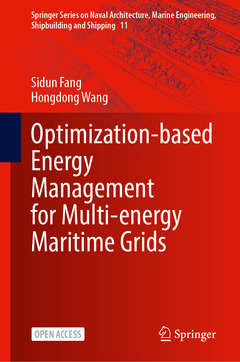Description
Optimization-Based Energy Management for Multi-energy Maritime Grids, 1st ed. 2021
Springer Series on Naval Architecture, Marine Engineering, Shipbuilding and Shipping Series, Vol. 11
Authors: Fang Sidun, Wang Hongdong
Language: English
Subject for Optimization-Based Energy Management for Multi-energy...:
Approximative price 52.74 €
In Print (Delivery period: 15 days).
Add to cartSupport: Print on demand
Description
/li>Contents
/li>Biography
/li>Comment
/li>
This open access book discusses the energy management for the multi-energy maritime grid, which is the local energy network installed in harbors, ports, ships, ferries, or vessels. The grid consists of generation, storage, and critical loads. It operates either in grid-connected or in islanding modes, under the constraints of both power system and transportation system. With full electrification, the future maritime grids, such as all-electric ships and seaport microgrids, will become ?maritime multi-energy system? with the involvement of multiple energy, i.e., electrical power, fossil fuel, and heating/cooling power. With various practical cases, this book provides a cross-disciplinary view of the green and sustainable shipping via the energy management of maritime grids. In this book, the concepts and definitions of the multi-energy maritime grids are given after a comprehensive literature survey, and then the global and regional energy efficiency policies for the maritime transportation are illustrated. After that, it presents energy management methods under different scenarios for all-electric ships and electrified ports. At last, the future research roadmap are overviewed. The book is intended for graduate students, researchers, and professionals who are interested in the energy management of maritime transportation.
Dr. Sidun Fang, born in 1991, received the B.E degree in the School of Electrical Engineering, Chongqing University, Chongqing, China, in 2012, and his Ph.D. degree of Power System and its automation in the School of Electronics Information and Electrical Engineering, Shanghai Jiaotong University, Shanghai, China, in 2017. Then he serves as a Research Fellow in the School of Electrical and Electronic Engineering, Nanyang Technological University, Singapore till 2020. Now he is a postdoctoral fellow in the Chinese University of Hong Kong. His research interests include optimal operation of mobile microgrids. Dr. Fang was awarded the Outstanding Graduate prize of Shanghai Jiaotong University and his doctoral dissertation was nominated as the Excellent Dissertation Papers in Shanghai Jiaotong University in 2017. He has organized many special issues in journals and was invited as tutorial presenters in various top-tier international conferences. He also serves as the associate editor of International Transactions on Electrical Energy Systems.
Dr. Hongdong Wang, born in 1989, received the degrees of undergraduate, master and Ph. D in Naval Architecture and Marine Engineering in Shanghai Jiaotong University. Dr. Wang is now the associate professor and doctoral supervisor in school of Naval Architecture, Ocean & Civil Engineering. Meanwhile, Dr. Wang is now the member of Youth Working Committee in the Chinese society of Naval architects and Marine Engineers and the director of China Association of the National Shipbuilding industry in Shanghai. His research area focuses on the development and effectiveness evaluation of marine intelligent equipment, and the intelligent control based on the dynamic properties of marine equipment. More than 40 research papers in above area have been published, while 15 patents have been authorized. In addition, amounts of projects are directed by Dr. Wang from National Natural Science Foundation of China,
Proposes the concept of maritime grids and investigates the energy efficiency management methods in fully electrified maritime grids
Proves the electrification of maritime transportation system is a promising route to improve the energy efficiency of maritime industry
Introduces corresponding energy management methods for all-electric ships in typical operating scenarios, i.e., weather routing, gas capture system integration, renewable integration, and cruise ships
Presents an operating framework for the future multi-energy seaport
Provides valuable guidance for the future integration of energy storage and fuel cell into maritime grids
Is an open access book



